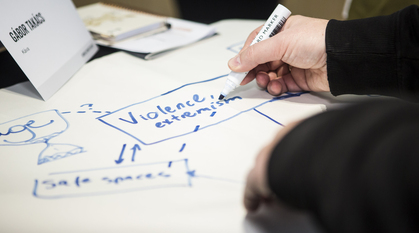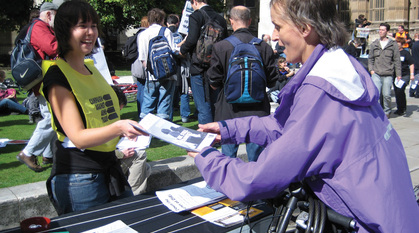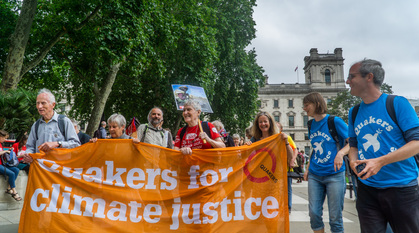How a fair tax system could help us Build Back Better
Olivia Hanks shares how a fairer tax system could lead to a more just, peaceful and sustainable world, and why churches have a key role to play in speaking about tax as a moral issue.

Sunday 14 June is Tax Justice Sunday: a day when Christians are encouraged to come together to reflect on the role of tax in society, and to speak out for a fairer tax system. This year it comes as many in the churches and in wider society are calling for tax reform to be part of how we build back better from the Covid-19 pandemic.
This week Tax Justice UK published a statement, signed by Quakers in Britain and Church Action for Tax Justice (CATJ), calling for enforcement of tax dodging laws, closing of tax loopholes, and more effective taxation of wealth. In April Paul Parker, the Recording Clerk for Quakers in Britain, signed a letter from CATJ, calling for a fairer tax system. It also welcomed the decisions of the Danish, French and Polish governments to refuse bailouts for corporations registered in tax havens. Both the Scottish and Welsh governments have since announced similar policies.
A fairer world
Tax justice is a key part of the more just, sustainable and peaceful world that Quakers are working for. The systematic use of a global network of tax havens, with the City of London at its centre, enables transnational companies and very wealthy individuals to benefit from publicly-funded services while contributing little or nothing in tax. It is estimated that this robs Global South countries of between $100bn and $300bn every year (for context, $100bn is roughly the size of Kenya's economy).
However, tax justice isn't simply a matter of paying what you owe – vital though this is. The kind of tax system a country has is a major factor in determining how equally its wealth is distributed. In the UK, while income tax is progressive (meaning those on higher incomes pay a higher rate), the overall tax system is regressive – the highest rate of tax is paid by the least well off. This is due to some very regressive taxes including national insurance and council tax, and to the fact that wealth is barely taxed at all.
The Covid-19 pandemic and the accompanying economic crisis will increase the gap between rich and poor, as many people lose work while those who are comfortably off are saving more. Some companies and individuals have also made enormous profits out of the pandemic, while many small businesses are struggling to stay afloat.
The courage to reform
If we want to address this vast and growing divide, we must use the tax system to do so – and there is no shortage of proposals, from IPPR's report on taxing all forms of income equally to a land value tax, which is supported in some form by several opposition parties.
At a moment when there is widespread recognition of the need for change, could politicians finally find the courage to implement major tax reforms? Maybe – but this will require sustained pressure from the public. Recent polling by Tax Justice UK found that 74% of the UK public want to see the wealthy paying more tax – that's a strong base from which to build a campaign.
A moral issue
Churches have a key role to play in speaking about tax as a moral issue. Justin Thacker of CATJ is in no doubt that we can make a real difference by speaking out. “The biblical call for economic justice runs throughout scripture from Genesis to Revelation," he says.
“Churches have been at the forefront of campaigns to end slavery, reform working conditions, establish schools and hospitals, end global south debt and promote fair trade. Tax justice is the next issue on our list and if we take seriously Jesus' words to love our neighbours, then seeking a fairer, greener tax regime will be part of what we do."
Last year, the World Council of Churches launched its Zacchaeus Tax campaign, recalling the story of Zacchaeus, whose encounter with Jesus prompts him to repent of his actions extorting money, and to make reparations by returning money to those he had exploited and giving half his possessions to the poor. The campaign calls for a global wealth tax, carbon taxes, and an end to tax dodging. It also calls for debt cancellation and reparations for nations impoverished by the transatlantic slave trade and suffering the impacts of climate breakdown.
It's worth reflecting on this approach to tax justice – not only shifting the balance of wealth in the present, but making reparations for past wrongs. Tax can be used not only to 'build back better' in our own era of crisis, but to underpin a global process of taking responsibility for colonialism, on which the Global North built its wealth at the expense of the rest of the world.


